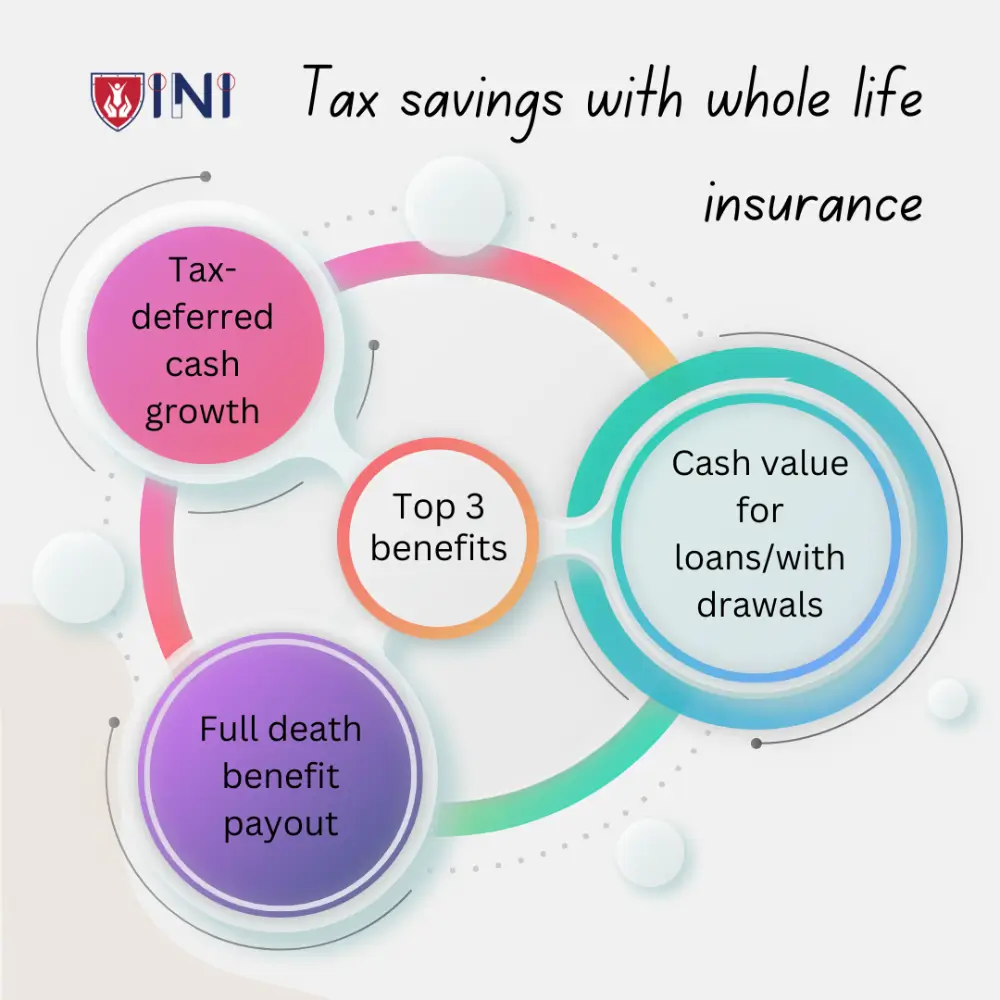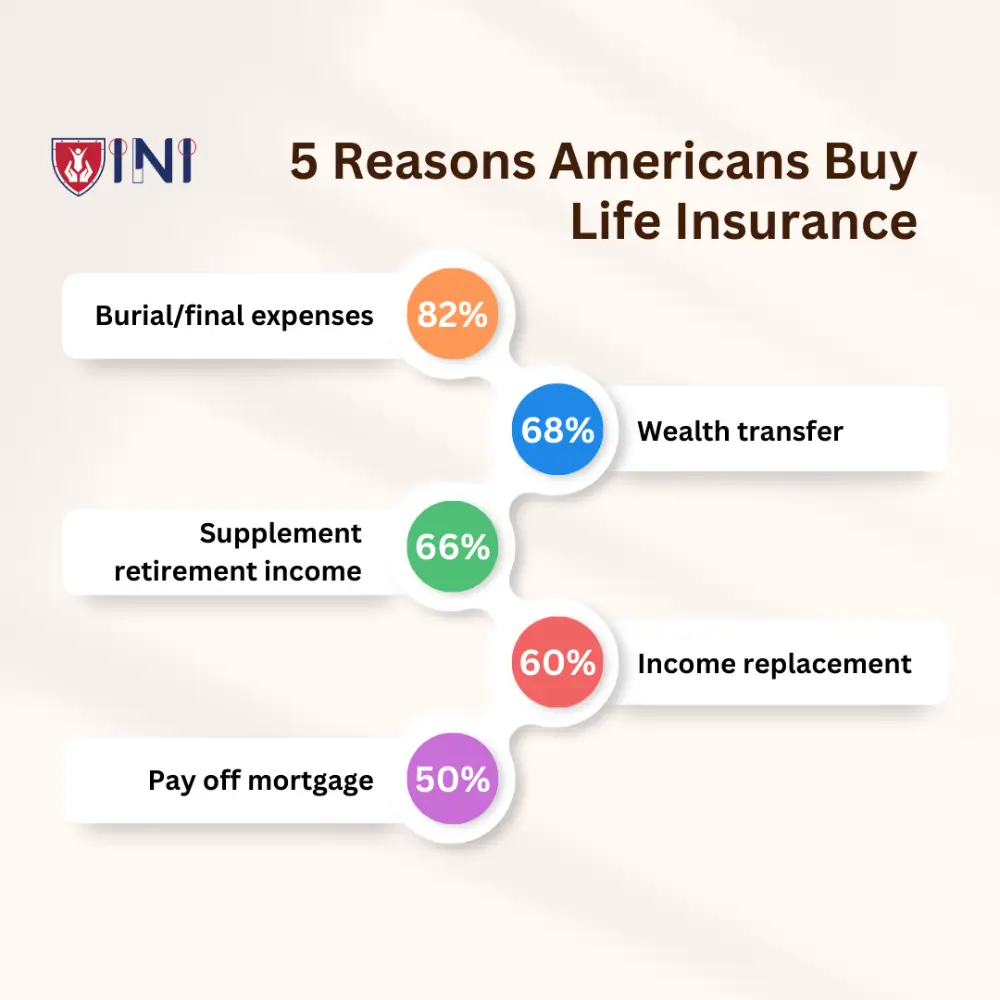Understanding Whole Life Insurance Tax Benefits and Dividend Rates 2024
Whole life insurance: Explained
Whole Life Insurance is permanent life insurance that not only comes with death benefits but also many features that can be used to build wealth as you pay your insurance premiums.is like a financial security blanket that provides coverage for your entire life.
The amount paid as premiums is the same every month so that you can plan your finances accordingly. That being said, let’s get to the tax advantages of whole life insurance.
Top 3 whole life insurance tax benefits
If you’re thinking that whole life insurance is only about providing financial security for your loved ones, it’s time to alter your thinking.
Apart from the financial protection, there are whole life insurance tax benefits that you can tap into.
So, come let’s figure out the top three tax advantages that make whole life insurance an attractive option for individuals looking to secure their financial future while building wealth.
-
Tax-deferred growth
One of the standout features of whole life insurance is the concept of tax-deferred growth. Unlike many other investment options, the cash value within a whole life insurance policy accumulates without being subject to immediate taxation.
This means that as your policy's cash value grows over time, you won't need to worry about paying taxes on the gains each year. This is what insurance gurus call “tax deferred”
This provides you with a valuable opportunity to build wealth more efficiently, allowing you to reinvest earnings and capitalize on compounding interest.
-
Tax-free death benefit
In the unfortunate event of the policyholder's passing, the death benefit is distributed to beneficiaries entirely tax-free.
This is a powerful advantage, especially when compared to other assets that may be subject to estate taxes or inheritance taxes.
Consider the peace of mind this provides to your loved ones during a challenging time.
Not only are they spared from the complexities of handling taxes on the received benefit, but they also inherit the entirety of the death benefit, ensuring financial security without the burden of facing additional financial obligations.
So, if the death benefit of a whole life insurance policy is $500,000, the beneficiaries will receive the full $500,000 without any deductions for federal or state taxes.
This tax-free distribution benefit helps in maintaining the financial stability of your loved ones.
-
Tax-free policy loans
As we mentioned earlier, whole life insurance goes beyond mere protection. It allows policyholders to access the cash value through tax-free policy loans.
This feature provides a level of financial flexibility that can be invaluable to you in various situations.
Whether you need funds for educational expenses, starting a business, or handling unforeseen financial challenges, a policy loan can be a strategic and tax-efficient solution.
If you want to access the accumulated cash value to meet these financial obligations, you are free to take out loans or withdraw money without paying taxes as long as the amount is equal to or less than the total insurance premiums you have paid.
This means you can borrow money from the savings in your insurance without having to pay taxes right away. It gives you a handy way to get cash when you need it without losing the special tax advantages that come with the policy.
There you go, here are the top three tax benefits of whole life insurance. You now know why they are a compelling choice for individuals seeking a comprehensive life insurance policy.
By understanding and leveraging these advantages, you can not only provide security for your loved ones but also minimize the tax you pay out of your hard-earned income.

Next up, let’s see how whole life insurance dividend rates help maximize your wealth.
What are dividends?
Dividends in whole life insurance are like a little bonus you get because you're a policyholder.
It's a share of the insurance company's profits that they give back to you. Imagine it as a reward for being part of your insurance company’s family.
How much dividend you get depends on how much money you've put into your policy. For example, if your policy is worth $45,000 and the dividend rate is 3%, you'll get $1,350 for the year.
If you add another $1,500 to your policy in the next year, your dividend will go up by $45, making it $1,395 for that year. These dividends can grow over time and help cover some of the costs of your insurance premium payments.
But here's the catch: some policies guarantee these dividends, while others don't. So, before you decide on a policy, make sure you read all the details.
Policies that guarantee dividends often cost more because there's a bit more risk for the insurance company. On the flip side, policies without guaranteed dividends might have lower premiums, but there's a chance you won't get any dividends in a specific year.
Lastly, it's a good idea to check how well the insurance company is doing financially. They usually get a grade from credit agencies, like A or better.
Upgrade the value of your policy and get your 5% Annual Dividend payouts from Indemnity National Insurance.
The better their grade, the more likely it is that you'll keep getting those dividends in the future. It is essential to know that your insurance company is doing well so that they can share the profits with you as you pay your premiums.
Now, let's take a quick look at what the dividend rates are like in 2024.
Whole life insurance dividend rates 2024
You will be surprised to know that the whole life insurance performance is highly dependent on the dividend rates.
As per the reports from Top Whole Life, the whole life dividend rates for 2024 have seen a positive increase.
Here’s a quick run-through of the whole life insurance dividend rates of insurance companies in the U.S.
| Insurance provider | Dividend rates 2024 |
|---|---|
| Mass Mutual | 6.10 |
| Penn Mutual | 5.75 |
| Guardian | 5.90 |
| Northwestern Mutual | 5.15 |
The whole life dividend rates are subject to change and you need to check if your policy is participating or non-participating. Is that necessary? Yes, absolutely. Here’s why:
Participating policies are the ones paying you dividends. They are usually sold by mutual insurance companies.
Non-participating policies don’t pay dividends, even if your insurance provider makes a profit.
So, if you’re looking to build wealth with your whole life insurance dividend, make sure to get a participating policy.
The whole life dividend rates are also dependent on the stock price. If the stock price falls, the dividend rates will rise, and in contrast to that when the stock price rises, whole life insurance dividend rates fall.
That’s about your whole life insurance dividend rates. Now, as promised we will share insider tips to maximize the benefits of whole life insurance.

3 tips to maximize your whole life insurance benefits
Whole life insurance is one of the best permanent life insurance policies as it comes with different features that provide protection as well as opportunities to grow your investments. So, here are a bunch of tips that can help you maximize your whole life insurance benefits.
-
Regular reviews and policy updates
Your whole life insurance policy can also act as an investment vehicle. So, you can’t leave your investments unnoticed. Keep reviewing and updating your insurance policy to ensure your cash value builds up without any interruptions.
This needs to be done as your life and financial goals change over time, so making sure your policy matches your current and future needs can benefit your loved ones.
-
Never take out higher policy loans
Now, let's talk about policy loans. Your insurance policy acts as a piggy bank. You are free to take out money from this piggy bank.
But, and here's the important part, taking too much money out can affect the rewards you get, like dividends.
So, have a quick call with your insurance provider before you plan to take out money from the accumulated cash value.
-
Get help from professionals
We get it! Getting life insurance is quite a task. So, getting help from insurance professionals will only help you get out of the maze.
They can help you create a plan that's just right for you. It's a bit like having a tour guide when you're exploring a new place.
Seeking professional advice ensures that your insurance strategy is personalized to fit your unique financial situation. You can get to know different ways to save as well as build wealth with your life insurance policies.
Yes, life insurance is meant to provide death benefits to your family members. In addition to this, you can also use additional features provided by your insurance providers. Follow these tips above so you can maximize the benefits offered by whole life insurance policies.
The bottom line
Getting dividends in your whole life insurance can boost the overall value of your policy and help you pay your premiums over time. However, it's important to know that these bonus payments are not guaranteed.
So, if getting these bonuses is crucial for your investment plans, look for an insurance company that has a good history of giving them out regularly. Check their track record to make sure they're reliable.
The same applies to your tax benefits of whole life insurance. The best choice depends on your situation and what you want to achieve with your money.
Whether you intend to utilize the dividends from your whole life insurance or access the accumulated cash value, ensure that it remains within your means of affordability.
Did you find this article helpful? Share it!






